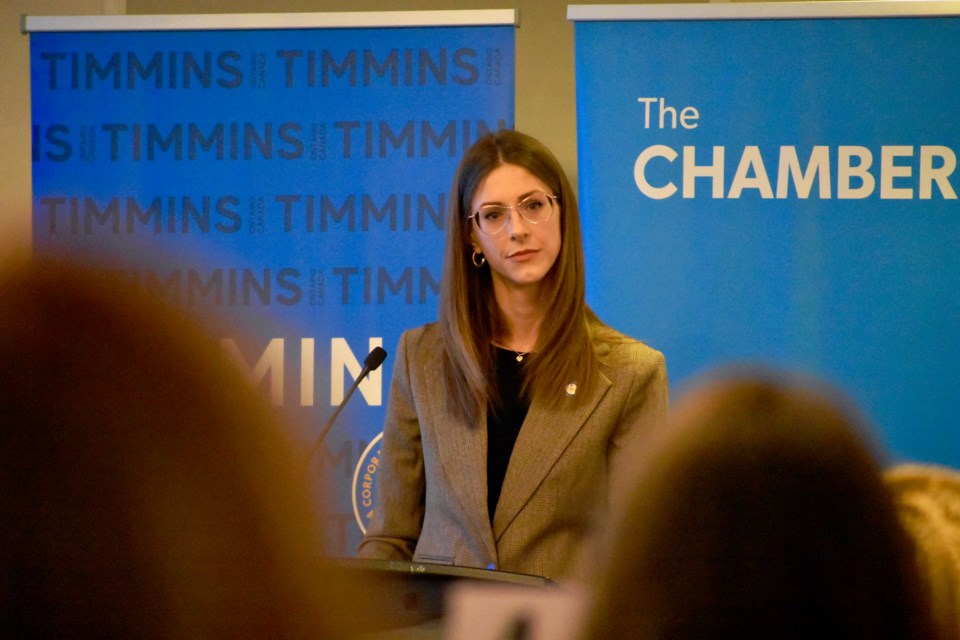With a year under her belt to settle into the office, Timmins Mayor Michelle Boileau delivered her second state of the city address.
The roughly 30-minute address to the business community at the Feb. 7 Timmins Chamber event included a rundown of council decisions over the past year. The topics included housing, safety, immigration and the return of the Ontario Northlander.
"I really wanted to present the opportunities that we have before us. I really want to encourage the business community to start thinking about how they can harness these opportunities and what that could mean for their business," she said after the presentation.
With Ontario Northland's passenger train expected to be back on the rails in the coming years, it's one opportunity that she wants the city and businesses to be thinking about.
"It just means more people can access Timmins, easier access to Timmins. But I truly believe that for businesses, for postsecondary institutions ... this could be built into marketing campaigns, this could be built into new business plans. So that was one thing that I really want to get across and get across that it's time to start thinking about it now because we're expecting service to start mid to late 2026," said Boileau.
There are two ways she said the city is planning for the Northlander.
There's the technical side that's focused on site planning, traffic flows or timing bus routes.
"But there's also another stream of activities that we can be doing, and that's doing that strategic planning for business. And so that's something that we're hoping that the economic development department in the city will be able to help work with the business community, and doing that strat(egic) planning," she said.
In the past year, community safety has been increasingly in the spotlight.
Over the summer, the city launched two pilot programs — overnight private security patrols and an enhanced outreach program.
"I can say that we've implemented a whole slew of initiatives that time will only tell really if we're seeing improvement from those," she said.
This summer, she said the city will have a better idea on how the programs are going and if there will be planning for more permanent options.
Last year, the safety improvement grant was also expanded so that business owners across the city qualify for up to $7,500 to add safety features such as security camera or fencing to their business.
"You know, the first step is prevention and we do believe that some of these safety measures that can be put in place, thanks to this grant, will help prevent a lot of property crime or petty crime that's happening," Boileau said.
"Again, that only goes so far, recognizing that a lot of the safety issues that, you know, that we're facing here in town, are related to much more complex societal issues.
"And so we're doing what we can as an immediate response, while we continue to advocate to upper levels of government on more resources so that we can be better supporting residents here."
In her speech, Boileau talked about believing that the city could grow to a population of 50,000 people in the coming years and eventually even have 100,000 people.
In the last census in 2021, the city's population dropped 1.5 per cent compared to 2016. The city is currently at around 41,145 people. Timmins' population peaked in the mid-'90s when there were over 47,000 people.
To grow, the city will need a place to house new people and a plan to attract people.
For new housing, she said there's potential for 150 to 200 new units in the Melrose Heights and Park Avenue subdivisions. The Cochrane District Social Services Administration Board (CDSSAB), she said, is working on adding 60 seniors' units to its building on Sterling Avenue, and there's also work to develop three fourplexes that would be dedicated to medical professionals.
To attract a new population, she's eying Africa.
One of the first steps is advocating for the Rural and Northern Immigration Pilot (RNIP) to be made permanent.
Right now, immigration is taken care of by the Timmins Economic Development Corporation. The city is dissolving the agency, however, and bringing its services under the municipal umbrella.
Because that decision was only made recently, Boileau said that as the service is brought over to the city, staff will get a better idea of what's needed.
In the meantime, she said the city will support postsecondary institutions and other partners that are recruiting newcomers.
"They're not all students. Some people are already coming to work and fill vacant positions. I'm really encouraged by that," she said.
"And, especially, it's important to look to Africa, if we want to maintain and increase the French language service offering in Timmins, because Africa has the largest and fastest-growing French-speaking population in the world. So it was definitely a talent pool that we could be tapping into there."
— TimminsToday




